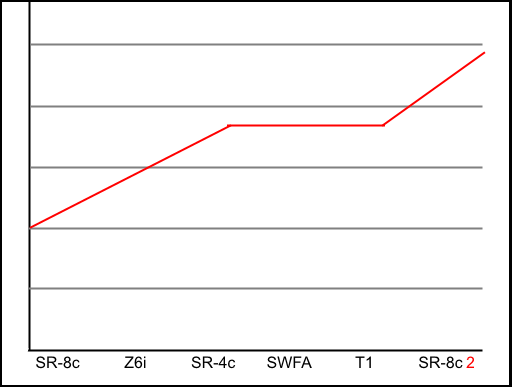What exactly is a plateau?
Options

lemonsurprise
Posts: 255 Member
Is this just a general word for when you haven't been loosing weight? Or is it specifically something going on in your body that everyone experiences? And if it is, then what is exactly going on?
How far in to the new diet do people experience it? Is it a regular thing that will happen every few weeks?
How far in to the new diet do people experience it? Is it a regular thing that will happen every few weeks?
0
Replies
-
 0
0 -

Lol. I think that's a mesa.0 -
A plateau is the thing I'm currently sitting upon...Stuck at 188...0
-
When your graph looks like this:

But upside down.0 -
A plateau is a frustrating holding pattern when you are busting your twinkies and nothing seems to be moving, or the questionable .25 gain...keep progressing, your body will eventually start catching up.0
-
a plateau for weight loss is when you haven't lost weight in at least 4-6 weeks.
This is typically due to the fact you are eating at maitenance. This could be for a couple of reasons tho.
1. NOt logging accurately (not weighing food and measuring liquid)
2. Not needing as many calories due to weight loss and failure to take that into account
3. Over estimating Calorie burns and eating them all back or even some if you really over estimate them.
I have gone 3 weeks and no weight loss but because I am sure of my logging I knew it would come..and it did week 4 woosh 2lbs gone in one week.0 -
"The evidence presented in this study indicates that even very high and unrealistic levels of metabolic adaptation do not affect the timing of weight plateaus. Rather, the seemingly innocuous intermittent loss of dietary adherence results in weight graphs with 6-mo plateaus, and these results point to the sensitivity of dietary adherence in determining the kinetics of weight loss."
From: https://dl.dropboxusercontent.com/u/2570111/Am J Clin Nutr-2014-Thomas-ajcn.113.079822.pdf
Basically, it's a lack of dietary adherence to calorie goals, often unintentional. It's why accuracy and consistency in both food intake (often underestimated) and exercise output (often overestimated) are key and with those two keys buckled down, you won't experience a plateau.0 -
Ok, so am I right in basically saying the person is usually causing the plateau themselves without knowing it? Rather than you body doing something uncontrollably? And it is avoidable?0
-
A plateau means you are eating at maintenance. It's easy to say that nothing has changed and you can't lose the weight, but often times we unconsciously underestimate food/overestimate exercise, or we haven't had the energy to workout as intensely and still eat the same.Is this just a general word for when you haven't been loosing weight? Or is it specifically something going on in your body that everyone experiences? And if it is, then what is exactly going on?
How far in to the new diet do people experience it? Is it a regular thing that will happen every few weeks?0 -
Ok, so am I right in basically saying the person is usually causing the plateau themselves without knowing it? Rather than you body doing something uncontrollably? And it is avoidable?
Yes, it's completely avoidable. You might have 2-3 weeks of no weight loss and then suddenly drop a few pounds. That's not a plateau. If someone complains of a 2-3 month plateau, it's because they're eating more than they think they are by either not being diligent about accuracy in either their calorie intake or in their exercise estimates.
You can avoid it by being accurate. No eyeballing, 'it's just a few bites' or just eating something and forgetting at the end of the day that you did.Then there's the output side. If a person is logging 1000s of calories for housework or walking, even running/biking (if the durations are quite long) then they are going to experience a self created plateau.
No one stops losing weight if they are in a true calorie deficit. It won't even slow significantly until you're practically skin and bones (real starvation).
Disclaimer: certain medical conditions can slow weight loss but those are not the norm0 -
You might have 2-3 weeks of no weight loss and then suddenly drop a few pounds. That's not a plateau. If someone complains of a 2-3 month plateau, it's because they're eating more than they think they are by either not being diligent about accuracy in either their calorie intake or in their exercise estimates.
This is key for me. I feel I am plateauing if there's no change for 2 or 3 days. It's frustrating and demoralising. The first time it happened I relied on the amazing support of my MFP pals and thinking, "Well, stick with it because the only other option is to get get fat again".0 -
2-3 days is meaningless as far as weight changes. Sodium content, glycogen, hydration level, and timing of your last bowel movement can effect weight in the short term. 2-3 weeks is enough time that you can rule out the previously mentioned factors from causing weight loss stalls.You might have 2-3 weeks of no weight loss and then suddenly drop a few pounds. That's not a plateau. If someone complains of a 2-3 month plateau, it's because they're eating more than they think they are by either not being diligent about accuracy in either their calorie intake or in their exercise estimates.
This is key for me. I feel I am plateauing if there's no change for 2 or 3 days. It's frustrating and demoralising. The first time it happened I relied on the amazing support of my MFP pals and thinking, "Well, stick with it because the only other option is to get get fat again".0 -
2-3 days is meaningless as far as weight changes. Sodium content, glycogen, hydration level, and timing of your last bowel movement can effect weight in the short term. 2-3 weeks is enough time that you can rule out the previously mentioned factors from causing weight loss stalls.You might have 2-3 weeks of no weight loss and then suddenly drop a few pounds. That's not a plateau. If someone complains of a 2-3 month plateau, it's because they're eating more than they think they are by either not being diligent about accuracy in either their calorie intake or in their exercise estimates.
This is key for me. I feel I am plateauing if there's no change for 2 or 3 days. It's frustrating and demoralising. The first time it happened I relied on the amazing support of my MFP pals and thinking, "Well, stick with it because the only other option is to get get fat again".
I know. I was taking the mickey out of myself.0 -
" Rather, the seemingly innocuous intermittent loss of dietary adherence results in weight graphs with 6-mo plateaus, and these results point to the sensitivity of dietary adherence in determining the kinetics of weight loss."
Oh, you mean cheating. Yeah, that'll do it.
'course, the author had to use all those words or it would not have been published.0 -
a plateau (/pləˈtoʊ/ or /ˈplætoʊ/; plural plateaus or plateaux), also called a high plain or tableland, is an area of highland, usually consisting of relatively flat terrain.0
-
" Rather, the seemingly innocuous intermittent loss of dietary adherence results in weight graphs with 6-mo plateaus, and these results point to the sensitivity of dietary adherence in determining the kinetics of weight loss."
Oh, you mean cheating. Yeah, that'll do it.
'course, the author had to use all those words or it would not have been published.
Well, since the word 'cheating' has many meanings and would not be universally understood since it can be considered dialect, it's probably good that writers of scientific papers strive to use word specificity. There's not a lot of point to a study if the wording can be easily taken out of context or misunderstood.0 -

Lol. I think that's a mesa.
For some reason, this made me LOL!0 -
" Rather, the seemingly innocuous intermittent loss of dietary adherence results in weight graphs with 6-mo plateaus, and these results point to the sensitivity of dietary adherence in determining the kinetics of weight loss."
Oh, you mean cheating. Yeah, that'll do it.
'course, the author had to use all those words or it would not have been published.
It is a mouthful, isn't it.0 -
a plateau (/pləˈtoʊ/ or /ˈplætoʊ/; plural plateaus or plateaux), also called a high plain or tableland, is an area of highland, usually consisting of relatively flat terrain.
:laugh:
Agree with most everyone, if hit a "plateau" you are not doing something right. 0
0 -
You can't just look at the weight, because a lot of it depends on what you're doing...I plateaued, weight-wise recently, but my body fat is dropping off rapidly...I lift a lot. 190lbs, 14% BF... 6 weeks ago I was 188lbs, 24% BF...0
-
In weight loss a plateau is considered no weight loss/gain after 6 weeks of being consistent in calories and/or exercise. Anything less would be considered a stall.
Fortunately, the majority of people who claim to be on a plateau, didn't match the criteria and somewhere along their journey, they DIDN'T adhere to their diet and/or exercise regimen. So essentially it's an easy fix.
I've personally only ran into it once with a client. Lasted for 2 months, then all of a sudden weight movement happened again. Now I can't say I was with her 24 hours a day, but talking her word on eating, I assumed she was being honest at the time.
A.C.E. Certified Personal and Group Fitness Trainer
IDEA Fitness member
Kickboxing Certified Instructor
Been in fitness industry for 30 years and have studied kinesiology and nutrition0 -
If we're specifically looking at weight loss though, then plateau's do exist. Not common though.You can't just look at the weight, because a lot of it depends on what you're doing...I plateaued, weight-wise recently, but my body fat is dropping off rapidly...I lift a lot. 190lbs, 14% BF... 6 weeks ago I was 188lbs, 24% BF...
A.C.E. Certified Personal and Group Fitness Trainer
IDEA Fitness member
Kickboxing Certified Instructor
Been in fitness industry for 30 years and have studied kinesiology and nutrition0 -
If we're specifically looking at weight loss though, then plateau's do exist. Not common though.You can't just look at the weight, because a lot of it depends on what you're doing...I plateaued, weight-wise recently, but my body fat is dropping off rapidly...I lift a lot. 190lbs, 14% BF... 6 weeks ago I was 188lbs, 24% BF...
A.C.E. Certified Personal and Group Fitness Trainer
IDEA Fitness member
Kickboxing Certified Instructor
Been in fitness industry for 30 years and have studied kinesiology and nutrition
Right. Most plateaus in weight loss simply exist in the mind.
Good job on the fat loss, brotha!!!0 -
Bump for when I 'm not seeing results0
-
This is key for me. I feel I am plateauing if there's no change for 2 or 3 days. It's frustrating and demoralising. The first time it happened I relied on the amazing support of my MFP pals and thinking, "Well, stick with it because the only other option is to get get fat again".
This is me right now I've consistently lost at least 1.5lbs / week since I started in mid-July. I weigh myself every morning, but officially weigh in every Tuesday morning. I have not lost so much as one ounce this week and there will likely be no loss for the official weigh in on Tuesday morning...it's sooooo frustrating. I'm trying to be ok with it though...just waiting for the movement again. 0
I've consistently lost at least 1.5lbs / week since I started in mid-July. I weigh myself every morning, but officially weigh in every Tuesday morning. I have not lost so much as one ounce this week and there will likely be no loss for the official weigh in on Tuesday morning...it's sooooo frustrating. I'm trying to be ok with it though...just waiting for the movement again. 0
This discussion has been closed.
Categories
- All Categories
- 1.4M Health, Wellness and Goals
- 396.5K Introduce Yourself
- 44.2K Getting Started
- 260.8K Health and Weight Loss
- 176.3K Food and Nutrition
- 47.6K Recipes
- 232.8K Fitness and Exercise
- 449 Sleep, Mindfulness and Overall Wellness
- 6.5K Goal: Maintaining Weight
- 8.7K Goal: Gaining Weight and Body Building
- 153.3K Motivation and Support
- 8.3K Challenges
- 1.3K Debate Club
- 96.5K Chit-Chat
- 2.6K Fun and Games
- 4.5K MyFitnessPal Information
- 16 News and Announcements
- 18 MyFitnessPal Academy
- 1.4K Feature Suggestions and Ideas
- 3K MyFitnessPal Tech Support Questions
















